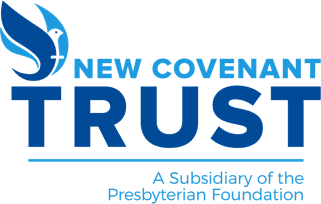
Faith- and values-based investors are called on to play a unique role in corporate shareholder advocacy. In a recent webinar, representatives from the Presbyterian Church (U.S.A.) and New Covenant Trust Company (NCTC) discussed how they are partnering to help both institutions and individuals make investments that are consistent with their values, as well as push corporations to be better global citizens.
Below is a summary of the webinar presentation. To view the full recording, click here.
Committee on Mission Responsibility through Investment
Rev. Kerri N. Allen, Chair of the PC(USA)’s Committee on Mission Responsibility through Investment (MRTI), began the presentation by sharing how MRTI works to drive lasting change in corporate business practices that make a positive impact on people and our planet by promoting the mission goals of the church through socially responsible investing.
Established in 1971 by the General Assembly, MRTI advocates for the pursuit of peace, social and economic justice, racial equality, environmental responsibility, and securing women’s and human rights. For more about MRTI, click here.
Rob Fohr, Director of Faith-Based Investing & Corporate Engagement for PC(USA) and an NCTC Board Member, discussed MRTI corporate engagement and divestment. He described the shareholder engagement process, which starts with determining whether a company is in compliance with GA directives, then involves engaging with the company (sometimes over the course of years), filing shareholder resolutions, and taking action to divest if recommended changes are not made in the company’s business practices.
Fohr shared examples of MRTI’s recent successful efforts to drive corporate responsibility related to climate change, including:
- In response to a shareholder resolution, AIG committed to achieve net-zero gas emissions across its investment portfolio by 2050
- Dollar General adopted new policies on chemical restrictions
- American Airlines agreed to evaluate and report on how its lobbying activities align with the Paris Climate Agreement
Fohr also discussed MRTI’s recommendations to the 225th General Assembly, which included a list of corporations recommended for divestment. The recommendations went to the boards of the PC(USA) Board of Pensions, the Presbyterian Foundation and New Covenant Trust Company, and all three voted to divest of those companies.
MRTI and NCTC Partnership
Rev. Jihyun Oh, both a New Covenant Trust Company Board Member and MRTI Member, shared how MRTI partners with NCTC on socially responsible investing strategies. It’s a working collaboration that includes shared staff and resources.
NCTC’s President & CEO, Greg Rousos, and Director of Investment & Portfolio Management Services, James Carey, shared that at its core, socially responsible — or values-based — investing takes into consideration a person’s or institution’s values in addition to financial goals and objectives. While MRTI takes the lead in driving advocacy efforts on behalf of the PC(USA), NCTC’s focus is on helping investors incorporate socially responsible tools when building their portfolios. Some of these tools include:
Negative screening/divestment. Most people are familiar with this tactic, which excludes companies or industries that are incompatible with an investor’s values. Examples might be gun manufacturers, tobacco companies or for-profit prisons. Carey cited the performance of NCTC’s fossil fuel free strategy, which fully divests from the fossil fuel industry. It achieves both its responsible investing goals while also providing close tracking to market returns.
Positive screening or integration. This newer tool includes measuring companies based on positive or proactive metrics and investing or overweighting “best in class” within each industry. Metrics might include board and management diversity, nondiscrimination policies, measures to promote equal opportunity and diversity, supply chain metrics on both labor rights and human rights, climate change strategy at the corporate level, and community involvement. For example, in NCTC’s Diversity, Equity and Inclusion strategy, only the top 10% of 3,000 companies rated on seven key DEI scores are eligible for consideration.
Thematic or impact Investing. This rapidly growing space involves investments that earn a market rate of return, while also contributing to a measurable positive or environmental impact. This may include bonds financing renewable energy infrastructure, affordable housing, or similar areas. Carey shared an example from Praxis funds, a fund partner of NCTC associated with the Mennonite church, in which an investment was made in the Community Reinvestment Fund USA (CRF). Small-business loans made from CRF are driving both successful entrepreneurship and community job growth.
Carey noted that NCTC believes that values-based investing strategies should be only additive to a portfolio, and there should not a trade-off between responsible investing and financial performance. Investors can, and should, be able to achieve market returns while incorporating their values into their investments.
2022 Review, Looking Ahead to 2023
Carey concluded the webinar with a look back at the 2022 investing year, and advice to investors for the year ahead.
Both stocks and bonds had a miserable year in 2022, making it one of the worst years for the balanced portfolios since the 1930s. Valuations were already stretched following three strong years in a row of +20% returns in the stock market.
As inflation picked up and the Federal Reserve was forced to hike interest rates aggressively, markets were challenged. Russia’s invasion of Ukraine only exacerbated inflationary pressures and uncertainty in markets.
While meaningful risks remain around the potential for an economic slowdown or even a mild to moderate recession, Carey was quick to suggest that it may not be all doom and gloom ahead. Valuations have already priced in a meaningful amount of pain and are starting at lower levels. Also, history supports the expectation for an eventual recovery.
Markets have been positive 75% of years historically, and while markets have been down -20% 7 times now since 1926, they’ve been up +20% over 30 times in that period.
Carey shared that opportunities exist for investors in 2023, especially for well-diversified portfolios in areas that have previously been undervalued by markets. Diversification by sector as well as geographically, including international investments, provide an opportunity for investors.
Final Thoughts
Jumping in and out of investments can hurt an investor’s long-term wealth accumulation. Carey recommends making major changes to your investment allocation only if there are changes to your situation, not based on near-term market volatility. NCTC also recommends evaluating opportunities to pick up income. Finally, diversification should continue to be beneficial to investors in this environment.
For more information about socially responsible investing or managing investments in a volatile market, don’t hesitate to contact us 800-858-6127, Ext. #6.
